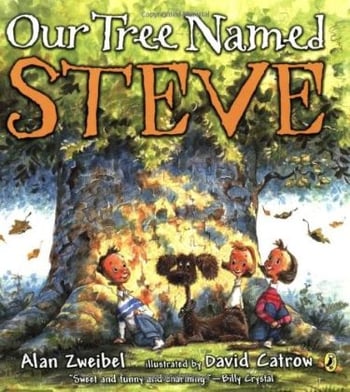This Week at READ USA
72,000 Books = 72,000 Opportunities for Learning and Growth
- Read USA Inc.
- May 17 2023
READ USA’s Book Fairs have officially distributed more than 72,000 books to 36,000+ elementary students across Duval County! We are immensely grateful for the generosity and support of our donors and volunteers who make the Book Fairs possible – and we still have 15,000 students at 28 schools to visit before the end of next week!
With READ USA’s Book Fairs focused on STEM-related topics this year, 72,000 books mean 72,000 new opportunities for students to explore the world around them. From animals to robotics to science to coding and everything in between, young students’ imaginations and knowledge can soar to new heights!
We are so thankful for the individual donors and organizations who have given their time, talent, or treasure to foster growth through literacy in our community’s youngest minds.
Yesterday, the Jacksonville Public Education Fund (JPEF) generously sponsored two Book Fairs at Pinedale and Reynolds Lane elementary schools near the Urban Core. Multiple JPEF team members volunteered their time to ensure the Book Fairs ran smoothly, put students’ names in their brand-new books, and help students explore new titles and topics! Thank you to the JPEF team for joining us yesterday!
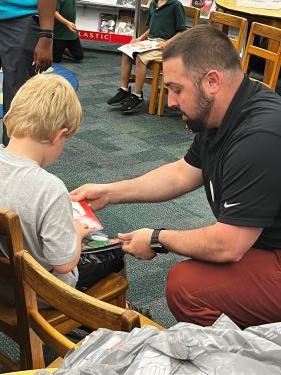
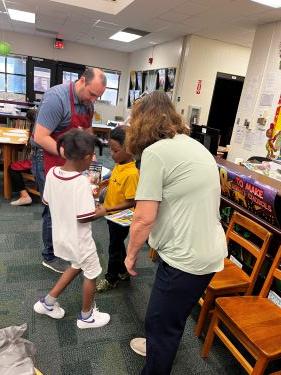
READ USA is Hiring Summer Tutors!
Summer Job Opportunity: Teens can improve children’s lives AND earn a living
READ USA’s Literacy Tutoring Program kicks off again this summer from June-July at Duval County Public Elementary Schools, providing an ideal opportunity for teens who are passionate about their community to earn a $15/hour living while improving the educational futures – and lives – of elementary students.
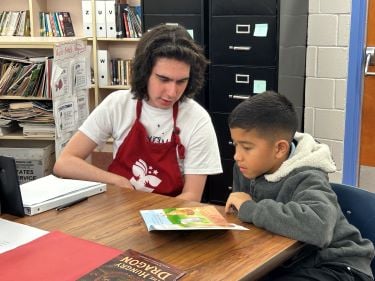
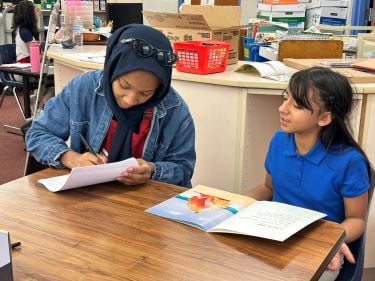
How Literacy Tutoring Works:
Teen tutors use pre-written lesson plans to deliver high-quality reading lessons to help elementary students improve their literacy skills. READ USA provides extensive training, onboarding, on-site support, and resources to teen tutors. Tutors have one-on-one access to supervising teachers during all tutoring sessions, who oversee, coach, and guide tutors in lesson delivery.
Who We Want:
- Teens aged 16-19 (high school or early college) who live nearby summer tutoring sites, including the Northside, Arlington, Southside, and Urban Core areas.
- Teens with the ability to work Tuesdays, Wednesdays, and Thursdays every week from 8:30 a.m. to 3 p.m. from June 12th to July 21st.
Teen Tutors Can Expect:
- $15/hour for 20 hours of work per week.
- Transportation (if needed) to and from the selected elementary school.
- To participate in two onboarding and training sessions (training and onboarding required and tutors are paid for the training session):
- Training Day 1 is offered June 5th or June 10th
- Training Day 2 is offered June 6th or June 11th
- To pass a national Level II background check and drug screen.
Want to hear from a Teen Tutor about their experience? Click here to watch.
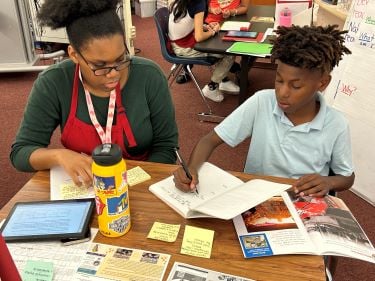
Children’s Book: Our Tree Named Steve, by Alan Zweibel
Illustrated by David Catrow
This week on May 16th we celebrated “Love a Tree” Day. This is an opportunity to spend some time enjoying the beauty of the trees around you and sharing with your children a delightful and touching tale of how a tree becomes a member of a family.
In Our Tree Named Steve, a father is writing to his children, who are visiting their grandparents, about something that has happened at home they need to know about. He begins by telling the story of how a tree became a member of their family. When the family was building their new home all the trees were being cleared to make room for the house. One tree, however, stood out to the children and the youngest child who could not say tree called the tree “Steve.” The name stuck, Steve was saved and soon became an integral part of family life. From shade, shelter, swings, hammocks and clotheslines to outdoor barbecues and snowstorms, Steve was the center of their outdoor activities. Now however, Steve’s time is over, for the tree was destroyed during a storm. The father breaks the news to his children as gently as he can by reminding them of all the wonderful memories and telling them “Steve will always be with us.” David Catrow provides delightful illustrations that express the happiness, love, playfulness, and sadness of the text.
All ages will delight in this story of a huge, beautiful, and versatile tree that through the years provided a place to play, relax, and share. Steve always stays strong and comforting even at the end where he is transformed into another special place for the family to enjoy.
Submitted by Kathi Hart, Tutoring Program Content Specialist
Parent Education Corner: Fine Motor Skills – They Matter!
Fine motor skills include the small movements of muscles that involve using the hands and fingers together to perform movements such as pinching and grasping. These types of movements are important for young children to practice because they lay the foundation for children to do everyday tasks such as grasping a pencil, buttoning and unbuttoning clothes, tying shoes, brushing teeth, cutting with scissors, and much more.
How can you help your child practice fine motor skills at home? Here are 5 simple activities that are fun and will help develop eye-hand coordination, develop finger control, and help your child learn how to manipulate objects.
- Play dough – Roll, squeeze, stretch, pat, pound, or use plastic scissors or rolling pins for cutting and rolling.
- Legos and blocks – Connecting, stacking, building with Legos and blocks.
- Pouring – Place objects (rice, sand, cereal, etc.) in one small container, then have your child pour the objects into another empty container.
- Threading or lacing – use beads, dry noodles, cereal, or buttons to thread onto string, yarn or pipe cleaners. Make lacing cards by punching holes into card stock cut into different shapes. Then provide string (shoestrings work well) or yarn for your child to lace through the holes.
- Tweezers, clothespins or tongs – Use tweezers, clothespins, or tongs to pick up and sort objects like beads, cereal, cotton balls, pompoms, or other small objects (watch closely for choking hazards)
These simple activities will support the development of the fine motor skills your child needs to become independent. Fine motor skills are needed to perform self-care tasks (i.e., brushing hair), daily tasks (i.e., turning the pages of a book), drawing, learning to write, and increasing their attention span.
Submitted by Kathi Hart, Tutoring Program Content Specialist
Do you have any questions or ideas for the Parent Education Corner? Anything you’d like to learn? Let us know here!

